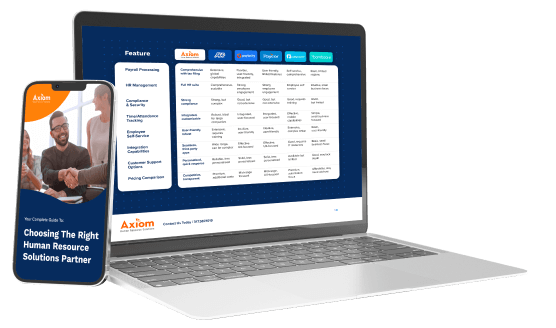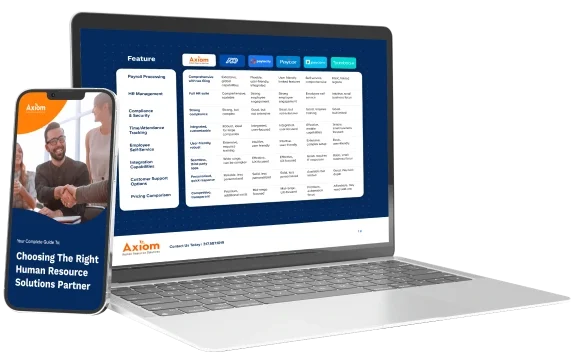
In an era of increasing automation, HR leaders face a critical question: Should AI decide salaries?
With the rise of AI in salary decisions, there’s a growing temptation to hand over compensation planning to algorithms promising speed, consistency, and cost savings. But the truth is more nuanced. While AI can process benchmarking data and flag inconsistencies at scale, compensation—at its core—is still a human decision that reflects values, culture, and leadership philosophy.
At Axiom HRS, we believe that AI is a tool—not a replacement—for human oversight. Here’s what HR teams need to know as they navigate the growing presence of automated decision-making in compensation strategies.
The Promise of AI in Salary Decisions
AI’s appeal in HR compensation comes down to three things: scale, consistency, and data depth.
Automated salary benchmarking tools can instantly scan vast labor market datasets, internal job architectures, and performance metrics to suggest salary ranges or flag outliers. For large or rapidly growing organizations, that can significantly streamline what was once a manual process.
More sophisticated platforms can even layer in pay equity analysis, identifying discrepancies across gender, ethnicity, or geography—useful for employers committed to fair and transparent compensation practices. But here’s the catch: raw data can’t see the whole picture.
Data Without Context = Risk
AI isn’t inherently biased. But it’s not inherently fair either.
If the data fed into an AI model reflects biased pay practices, the model can reproduce and even reinforce those patterns. That’s the ethical dilemma at the heart of AI in pay equity analysis.
For example, if an algorithm “learns” from historical data where certain demographics have been underpaid, it may normalize lower ranges for those profiles. Left unchecked, this can unintentionally codify discrimination under the guise of efficiency.
This is why ethical AI in HR isn’t just about using smart tools—it’s about knowing when and how to apply judgment, context, and human leadership.
The Case for Human Oversight
At Axiom HRS, we advise our clients to treat compensation decisions as a strategic leadership exercise, not just a math problem.
Here’s where human oversight remains indispensable:
- Career Trajectory: AI can’t always factor in soft potential, role evolution, or organizational investment in an employee’s growth.
- Cultural Fit and Values: Compensation signals what a company values. Decisions around retention, performance bonuses, and new hire offers often reflect leadership vision.
- Market Fluidity: No model can fully predict or understand real-time hiring dynamics in niche roles or volatile sectors. Local context and recruiter experience matter.
- Legal Implications: Pay decisions—especially those linked to equity audits—carry compliance risks. HR leaders must ensure transparency and defensibility.
When used strategically, AI can assist by providing a foundation of insights. But it should not become the final decision-maker.
Use AI to Inform, Not Replace
Think of AI like a salary GPS: it helps chart a course, but human drivers still choose the route.
Here’s how Axiom helps clients leverage automated salary benchmarking tools the right way:
- Custom Calibration: We guide organizations in aligning AI salary tools with internal compensation philosophies, not just external data.
- Pay Equity Reviews: Our team audits AI-driven results for fairness and legal defensibility, ensuring nothing is missed in the nuance.
- Decision Support: We empower HR teams with dashboards and models that support—not dictate—salary planning conversations.
- Training Leaders: Our compensation strategies include workshops that teach managers how to interpret AI-driven recommendations with context and responsibility.
In other words, we make sure your people stay in charge, with technology as the co-pilot.
AI Tools Will Keep Advancing—So Should Your Oversight
As platforms evolve, organizations may be tempted to lean further into automation. But speed should never come at the cost of trust or equity.
Companies that win in the long term will be those that balance automation with accountability, ensuring that their compensation decisions are fair, strategic, and human at their core.
Tech-Enabled, People-Led
AI in salary decisions is here to stay. But the question is not whether to use AI—it’s how to use it wisely.
At Axiom HRS, we believe compensation is a powerful expression of what a company values. Let’s make sure it’s expressed with data intelligence and human insight—together.
Frequently Asked Questions: AI in Salary Decisions
What is AI in salary decisions?
AI in salary decisions refers to the use of machine learning or algorithmic tools to automate compensation tasks, such as benchmarking salaries, analyzing pay equity, or recommending pay ranges based on performance data and market conditions.
Can AI tools replace HR professionals in compensation planning?
No. While AI can support decision-making through automation and analysis, compensation requires human oversight to ensure fairness, legal compliance, and alignment with company values.
How does AI help with pay equity analysis?
AI tools can identify statistical disparities in compensation across demographics such as gender, race, or location. However, these tools must be paired with human review to interpret context and avoid reinforcing historical bias.
What are the risks of using AI in salary decisions?
Risks include reinforcing biased patterns from historical data, lack of transparency in decision logic, and overlooking qualitative factors like career potential or organizational culture fit.
How can Axiom HRS help implement AI in compensation?
Axiom HRS works with clients to calibrate AI tools to fit their compensation strategy, train managers to interpret AI recommendations, and conduct equity reviews to ensure fair, defensible outcomes.



